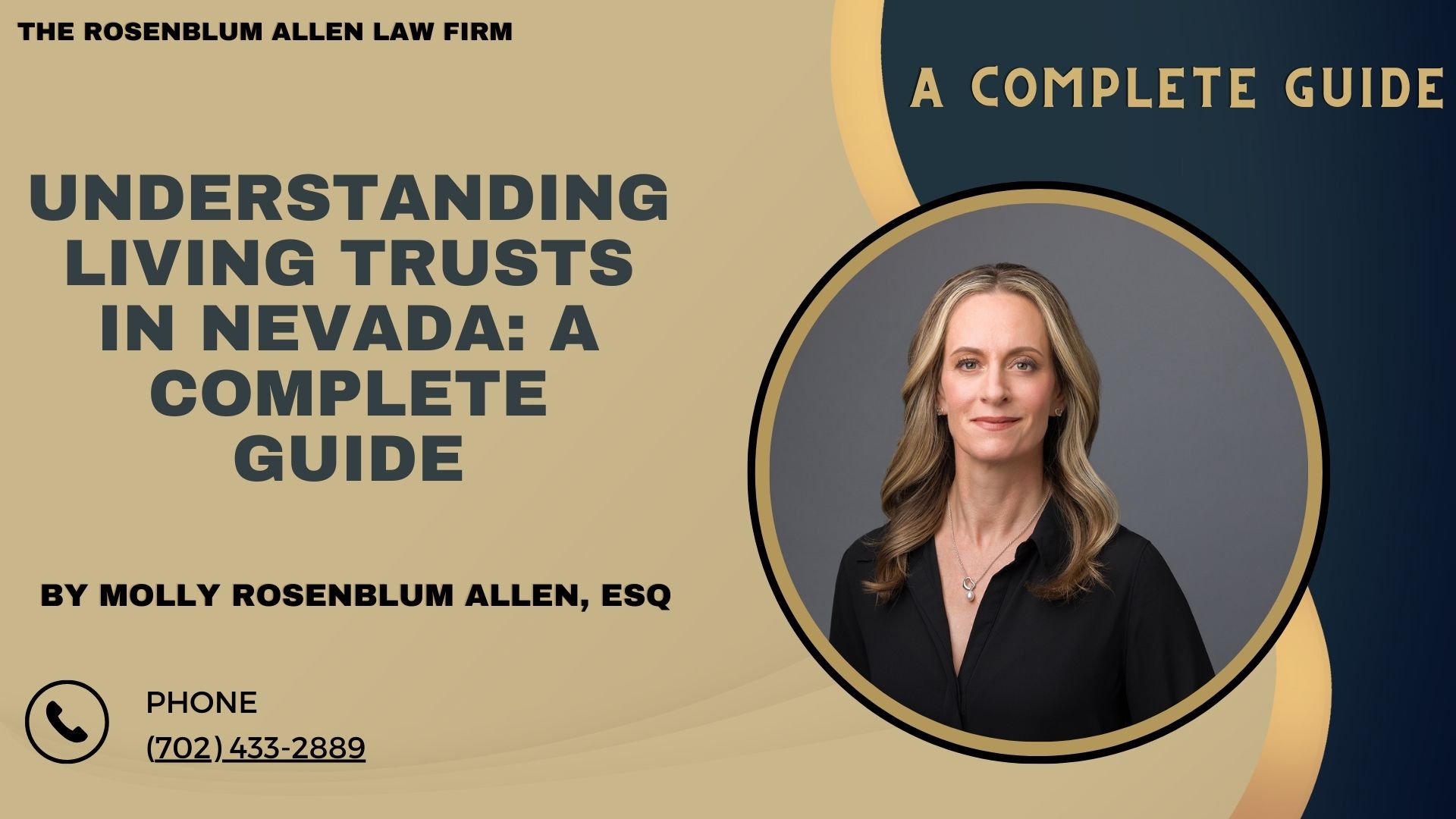Creating a living trust in Nevada is vital for many residents looking to manage their assets and ensure a smooth transition for their heirs. This comprehensive guide is designed to walk you through the why, how, and what of setting up a living trust in the Silver State.
Note: Make sure to check out our Understanding What is a NING Trust post before you leave too.
What is a Living Trust?
A living trust is a legal document allowing you to place your assets in a trust for your benefit during your lifetime, with the remaining assets transferred to your designated beneficiaries upon death. It’s a powerful tool for estate planning, offering several advantages over a traditional will.
Benefits of a Living Trust in Nevada
Avoids Probate: One of the most significant advantages is avoiding the lengthy and costly probate process.
Privacy: Unlike a will, a living trust is not a public record, keeping your estate matters private.
Control: You can specify exactly how and when your assets are distributed to your beneficiaries.
Flexibility: Living trusts can be revised or revoked as your circumstances or wishes change.
Types of Living Trusts
Revocable Living Trust: Can be altered or revoked at any time during the grantor’s lifetime.
Irrevocable Living Trust: This cannot be easily changed once established, offering potential tax benefits and asset protection.

How to Set Up a Living Trust in Nevada
Setting up a living trust in Nevada involves several key steps. Each step is important to make sure your trust is valid and reflects your wishes.
Determine the Type of Trust
Individual vs. Joint Trust: Decide whether you need a separate or joint trust, often used by married couples.
Choose Your Trustee
Successor Trustee: Selecting a trustworthy person or institution to manage your trust after your death is crucial for the smooth execution of your estate plan.
Inventory Your Assets
Identifiable Assets: List all assets you wish to include in the trust, such as real estate, bank accounts, and personal property.
Create the Trust Document
Hire an Attorney: While creating a trust document on your own is possible, consulting with an estate planning attorney ensures your trust complies with Nevada law and meets your specific needs.
Transfer Assets to the Trust
Deed and Titles: Change the titles of your assets from your name to the trust’s name to officially transfer ownership.
Notify Beneficiaries and Heirs
Open Communication: Informing your beneficiaries and heirs about the trust can prevent confusion and disputes after your death.
Follow these steps. They ensure that your living trust is set up well and quickly in Nevada.

Managing Your Living Trust in Nevada
After setting up your living trust, it’s not something you can just set and forget. Managing it well keeps it effective. It also makes sure it reflects your wishes and life.
Updating Your Trust
Life is full of changes, and your living trust should evolve with you. Keeping your trust updated is crucial. This is true for new assets, changes in beneficiaries, or a new successor trustee.
Review Regularly: Aim to review your trust every few years or after significant life events like marriage, divorce, the birth of a child, or acquiring important new assets.
Amendments: If changes are needed, you can amend your trust document. This process typically involves drafting an amendment attached to the original trust document.
Funding Your Trust
A living trust only controls the assets that have been placed into it. If you acquire new assets, don’t forget to title them in the name of the trust.
Stay Vigilant: Regularly check that all new assets are appropriately titled to the trust. This might include real estate, vehicles, or new bank accounts.
Trust Administration
If you become incapacitated or die, the successor trustee will take over. They will manage the trust. It is vital for a smooth transition that they understand their duties and the trust’s terms.
Successor Trustee Duties include paying debts and taxes, distributing assets to beneficiaries, and managing the trust’s assets until distribution.
Communicate: Regularly discuss with your successor trustee to ensure they are prepared for their role.

The Role of Trusts in Estate Planning
We’ve covered the basics and managing living trusts. But, let’s now delve into how a living trust fits into Nevada’s broader estate planning.
Integrating Living Trusts with Other Estate Planning Tools
Power of Attorney: A crucial document that allows someone else to handle your affairs if you become incapacitated.
Healthcare Directive: Specify your wishes for medical treatment if you cannot communicate them yourself.
Beneficiary Designations: Ensure that your retirement accounts and insurance policies have up-to-date beneficiaries, as these assets bypass the trust and will.
Estate Planning Goals
Protecting Your Legacy: A well-structured estate plan, including a living trust, covers your legacy and ensures your wishes are honored.
Caring for Loved Ones: Make provisions for dependents, including guardianship arrangements for minor children.
Minimizing Conflict: Stated wishes can reduce conflicts among heirs and beneficiaries.

When to Seek Professional Advice
Creating and managing a living trust involves hard choices. These choices can have long-lasting impacts on your estate and your heirs.
Consulting with Estate Planning Professionals
Estate Planning Attorney: Can provide legal advice tailored to your situation, ensuring your living trust and other estate planning documents are properly drafted and executed.
Financial Advisor: Can offer insights into how a living trust fits your financial plan, especially about tax planning and asset management.
Tax Professional: Essential for understanding the tax implications of your estate plan and ensuring compliance with federal and state tax laws.
The Importance of Professional Guidance
Peace of Mind: Knowing your estate plan is in order can provide immense peace of mind for you and your family.
Customization: Every estate is unique, and professionals can help tailor your plan to meet your specific needs and goals.

Keeping Your Trust in Compliance
Nevada’s laws can change. Staying compliant is critical. It ensures your living trust works as intended.
Regular Legal Reviews
The Practice: Have your trust document reviewed by an estate planning attorney every few years or after significant legal changes to ensure it complies with Nevada laws.
Understanding Trust Administration
The Practice: Both you (as the trustee of your revocable trust) and your successor trustee should understand the basics of trust administration, including tax filings and asset management requirements.

Final Thoughts for a Comprehensive Estate Plan
A living trust is a cornerstone of many estate plans, but it’s not the only tool available. Ensuring that your wishes are honored involves integrating a full strategy. It also ensures that you care for your loved ones.
Holistic Planning
Consider how your living trust interacts with other aspects of your financial life, including retirement accounts, life insurance policies, and overall tax strategy.
Legacy and Charitable Giving
Leaving a Legacy: Beyond asset distribution, consider how you want to be remembered. Charitable donations or establishing scholarships can be part of your living trust.
Family Heirlooms and Personal Items: Don’t overlook the emotional value of personal belongings. Clear instructions can prevent family disputes.
Professional Advice Is Key
Collaborate with Professionals: Estate planning is complex, and laws change. Working with professionals ensures your plan is effective and compliant and reflects your wishes.
Remember, a living trust is more than just legal documents. It’s a way to protect and provide for your loved ones. It also helps you manage your assets well and leave a lasting legacy. You avoid common pitfalls. You keep your trust in compliance. You’re taking necessary steps. Seeing your estate plan as part of a bigger picture will bring peace of mind. It will do so for both you and those you care about.

Breaking It All Down
We have completed our journey through the world of living trusts in Nevada. We’ve covered many essential aspects for anyone considering this useful estate planning tool. We’ve covered the benefits and meaning of a living trust. We’ve also covered setting one up, managing it, and even dissolving it in Silver State.
Key Takeaways
Personalized Estate Planning: Living trusts offer a flexible, private, and efficient way to manage and distribute your assets tailored to your needs and circumstances.
Family Dynamics: Open and honest discussions about your living trust can enhance family dynamics by setting clear expectations and reducing potential conflicts.
Business Succession: For business owners, incorporating a living trust into your succession planning ensures continuity and protects the business’s legacy.
Ongoing Management: A living trust is not a one-time task but an ongoing process that requires regular reviews and updates to reflect changes in your life and assets.
Professional Guidance: The complexity of estate planning laws and tax regulations underscores the importance of seeking professional advice to ensure your living trust is correctly established and maintained.
Final Thoughts
Making a living trust in Nevada is a big step. It secures your financial legacy. You ensure that you care for your loved ones as you wish. It’s about more than just giving away your assets. It’s about providing for your loved ones. It’s about ensuring the continuity of your life’s work and leaving a lasting legacy.
Remember, you cannot overstate the peace of mind that comes from knowing your estate is in order. By taking the time now to set up and manage a living trust, you’re not just planning for the future. You’re protecting it. The trust will ensure that it honors your wishes and provides for your loved ones in the best way possible.
As you do your estate planning, remember: the journey doesn’t end when you sign your trust. It continues with the talks you have. And the changes and steps you take to ensure your plan grows with you. With the right guidance and clear goals, a living trust can be key to an estate plan. It will reflect your wishes and secure your legacy for generations.

Frequently Asked Questions
Can I be my own trustee in a Nevada living trust?
Absolutely. You can serve as your trustee, managing the trust’s assets during your lifetime. If you become incapacitated or pass away, a successor trustee named in the trust document takes over.
What happens to a living trust in Nevada if the trustee dies?
If the trustee passes away, the successor trustee named in the trust document assumes control and administers the trust according to its terms.
Do living trusts in Nevada come with annual fees or taxes?
Revocable living trusts in Nevada don’t incur annual fees or taxes just for existing. However, any income generated by trust assets might be subject to federal (and sometimes state) income tax.
How does a Nevada living trust protect against creditors?
While assets in a revocable living trust aren’t typically shielded from creditors during the grantor’s lifetime, certain irrevocable trusts may offer asset protection benefits.
Can a living trust own property in another state?
Yes, a living trust established in Nevada can hold property located in another state, which can help avoid probate proceedings in multiple jurisdictions.
Is a Nevada living trust revocable or irrevocable?
It depends. A revocable trust allows changes or revocation during the grantor’s lifetime, while an irrevocable trust generally cannot be altered.
Does a living trust cover all my assets automatically?
No, a living trust only includes assets formally transferred into its name. You must retitle or assign ownership of assets to the trust.
What’s the difference between a living trust and a will in Nevada?
A living trust manages and distributes assets during and after death without probate, while a will specifies asset distribution after death, usually subject to probate.
Can a living trust fully avoid estate taxes in Nevada?
While it can help reduce estate taxes, it might not eliminate them entirely. Various estate planning strategies, including trusts, can help lessen the tax burden.
How long does settling a living trust after death take in Nevada?
The duration varies based on factors like trust complexity, asset types, and any disputes, ranging from months to years.
Can a living trust be contested in Nevada?
While less common than contesting wills, grounds for contest may include lack of capacity, undue influence, or improper trust formation.
Is legal counsel necessary to establish a living trust in Nevada?
While it’s possible to create one without legal help, consulting an estate planning attorney ensures proper setup aligned with your needs.

Glossary
- Asset Protection: The strategic positioning of assets to minimize vulnerability to creditors and legal judgments.
- Beneficiary: An individual or entity designated to receive assets from a trust, estate, account, or insurance policy upon the death of the account holder or grantor.
- Estate Planning: The process of arranging the management and disposal of a person’s estate during their life and after death, including the handling of estate taxes and the distribution of assets to beneficiaries.
- Grantor (or Settlor or Trustor): The person who creates a trust, contributing assets and dictating the terms under which they’re managed and distributed.
- Guardianship: A legal arrangement under which an individual (the guardian) is given the legal right and duty to care for another person or property, mainly due to the other’s incapacity or disability.
- Irrevocable Trust: A type of trust that, once established, cannot be altered, amended, or revoked by the grantor. This type of trust often provides tax benefits and asset protection.
- Living Trust: A legal document created during an individual’s lifetime that allows for efficient transfer of their assets upon death while avoiding probate.
- Probate: The legal process through which a deceased person’s will is validated and their estate is settled, including the distribution of assets to heirs and the payment of debts.
- Revocable Trust: A trust that can be altered or terminated during the grantor’s lifetime. It becomes irrevocable upon the grantor’s death.
- Successor Trustee: An individual or institution appointed to manage the trust upon the incapacity or death of the original trustee.
- Trust: A fiduciary arrangement in which a third party, or trustee, holds assets on behalf of a beneficiary or beneficiaries.
- Trust Document: The legal document that establishes a trust, outlining its terms, beneficiaries, and the assets it includes.
- Trustee: The person or institution responsible for managing the trust’s assets according to the trust document’s terms.

Additional Resources for You
Comprehensive Overview: Start with a brief introduction to the importance of estate planning, referencing the Las Vegas Estate Planning Attorney and Estate Planning Services pages for a full spectrum of services offered by your firm.
Trust Formation: Highlight the significance of setting up a trust in Nevada, directing readers to the Las Vegas Trust Attorney page for effective guidance on creating a trust that meets their specific needs.
Practical Tips: Incorporate valuable insights and actionable advice by pointing to the Tips On Estate Planning post, offering readers easy-to-follow steps for beginning their estate planning journey.
Checklist for Planning: Utilize the Estate Planning Checklist as a tool for readers to assess their current estate planning status and understand the key components they need to consider.
Will Creation: Emphasize the critical role a will plays in estate planning, using the Making a Will post to discuss the process and benefits of having a legally binding will.
Avoiding Mistakes: Address common pitfalls in estate planning with the Estate Planning Mistakes post, providing readers with knowledge to avoid these errors.
Understanding Probate: Offer insights into the probate process and how proper estate planning can simplify or bypass this procedure, as detailed in the Estate Planning Probate post.

Outside Resources for You
American Bar Association (ABA): An extensive resource offering information on various legal topics, including defense rights and legal representation. Visit ABA
National Association of Criminal Defense Lawyers (NACDL): Provides resources and advocacy for criminal defense lawyers and individuals facing criminal charges. Visit NACDL
FindLaw: A comprehensive resource for legal information, including articles on criminal law and the legal process. Visit FindLaw
Justia: Offers a wide range of legal resources, including case law, statutes, and articles on criminal defense strategies. Visit Justia
Avvo: Provides legal advice, lawyer directories, and forums for asking legal questions on criminal defense and other legal areas. Visit Avvo
Nolo: Offers detailed articles, FAQs, and legal guides on criminal law, rights, and how to navigate the legal system effectively. Visit Nolo
National Legal Aid & Defender Association (NLADA): Dedicated to providing legal representation resources for those unable to afford an attorney, with a focus on criminal defense. Visit NLADA

A Special Message from Our Lead Attorney, Molly Rosenblum Allen, Esq

Thank you so much for taking the time to explore our resources. We hope you found the information helpful and enlightening. You are navigating the complexities of estate planning and living trusts. Knowing your options and the law is crucial. It helps you make informed choices about your future and the legacy you want to leave.
If you have questions or are ready to secure your estate, please call Molly, me, and my team at (702) 433-2889. We’re here to guide you through the process. We’ll provide the support and expertise you need to tailor a plan to your unique situation.
I look forward to helping you get the ball rolling on securing your future.
Warm regards,
Molly





